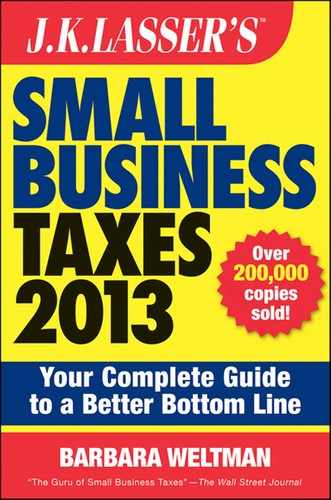Legal and Professional Fees
Legal and professional fees related to your business are deductible. Professional fees may include, for example, not only legal fees but also accounting fees, actuarial fees, systems analyst fees, and appraisal fees.
Legal Fees
Legal fees for business matters generally are deductible as an ordinary and necessary business expense. Examples of deductible legal fees include fees incurred for:
- Assistance in collecting outstanding accounts payable
- Defending against a claim of infringement of intellectual property
- Defending against charges of mismanagement of a retirement plan
- Defending against shareholder allegations of misconduct
- Defending against wrongful discharge actions
- Obtaining an IRS ruling
- Tax advice
Not all legal fees are currently deductible. Examples of nondeductible legal fees include fees incurred for:
- Acquiring a capital asset. The fees are added to the basis of the asset. For example, if you pay attorney’s fees to handle the closing when you buy your office building, the fees become part of the basis of the office building and are recovered through depreciation.
- Actions that are personal in nature, such as legal fees to pursue a personal injury action, even if the injury occurred during a business trip; to prepare a will even if it includes a business; and to settle a divorce even if it relates to reserving your interest in a business. The portion of fees that can be allocated to tax advice, however, is deductible.
- Incorporating a business or setting up a partnership or LLC. These costs are treated as incorporation fees or organizational costs for a partnership, and are currently deductible up to a set dollar limit; excess amounts must be amortized, as discussed in Chapter 14.
- Suing for infringement. The costs are added to the basis of the intellectual property.
Accounting and Tax Preparation Fees
If you pay an accountant to show you how to set up your books or to keep your books for you, the accounting fees are deductible. Also deductible are fees for accounting advice, such as advice on whether to change your method of accounting or your method of inventory. The same is true for fees for accounting representation at an IRS audit.
Accounting fees incurred in investigating whether to buy a business are not currently deductible but may qualify as start-up expenses. The treatment of start-up costs is discussed in Chapter 14.
If you pay an accountant or other tax professional (paid preparer) to complete your tax return or contest a tax deficiency for your business (Form 1065, Form 1120, or Form 1120S), the cost is fully deductible on the appropriate return. If you are self-employed, the allocable cost of preparing Schedule C or contesting a tax deficiency related to it is a deductible business expense that can be claimed on Schedule C. The balance of tax preparation fees is deductible as a miscellaneous itemized expense on Schedule A, subject to the 2%-of-AGI rule.
Recovering Legal Fees and Other Costs from the Government
If you are involved in a tax dispute with the IRS and you win, you may be able to make the government pay any reasonable costs of your tax contest. You must have exhausted your administrative remedies and have substantially prevailed in your tax dispute. The IRS has the burden of proving that its position in going after you was substantially justified. If the IRS did not follow published regulations, revenue rulings, revenue procedures, information releases, notices or announcements, private letter rulings, determination letters, or technical advice memoranda issued to you, then there is a rebuttable presumption that the IRS’s position was not substantially justified. Also, the fact that the IRS has lost in other appellate courts on substantially similar issues must be taken into account in determining whether the IRS’s position was not substantially justified. If you succeed, you can recover attorney’s fees at the rate of $180 per hour in 2012. In limited circumstances, a higher award may be possible.
If you are successful in your claim to recover costs from the government (e.g., if the IRS fails to prove that it was substantially justified in its position), you cannot also take a deduction for these costs. If you have already taken a deduction for your costs, you must include the government’s award in your income.
The opportunity to recover legal fees from the government is limited to an individual with a net worth below $2 million. In the case of businesses, the net worth requirement is below $7 million and fewer than 500 employees.
Lobbying Costs
Fees paid to professional lobbyists to influence legislation on the federal, state, or local level are not deductible. However, in-house lobbying costs up to $2,000 are deductible.
